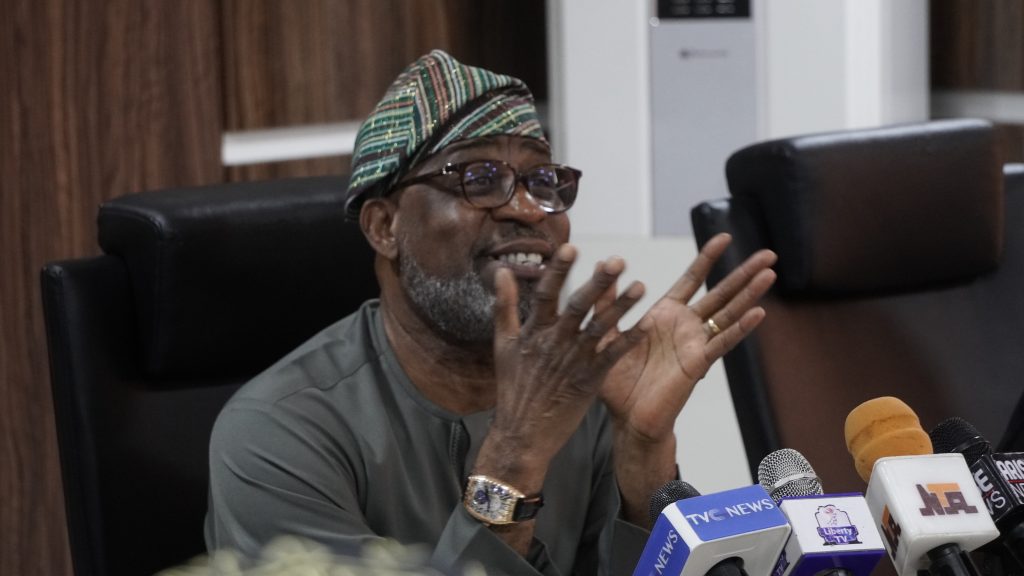
The Minister of Solid Minerals OLADELE ALAKE stated this on Sunday during a press conference organized to engage members of the media on the road map for the sector.
According to the Minister, a significant and interesting fact is that the solid minerals sector that was exploited by the colonial government for export contributed 4.5 percent to Nigeria’s Gross Domestic Product in the ’60s, and 5.6 percent by 1980 accounted for less than 2 percent of Nigeria’s GDP last year. To demonstrate the gravity, compare this performance to the records of less-endowed countries such as Senegal (20%), Mauritania (24%), and Namibia (50%).
One wonders how a country with industrial, energy, metallic, construction, and precious minerals, including gold, manganese, bitumen, lithium, iron ore, lead, zinc, limestone, uranium, columbite, barite, kaolin, gemstones, coal, topaz, copper in massive proportions fail to use these resources to liberate the citizens?
The minister noted that as at the last count, our estimated reserves include Gold (1 million ounces); Limestone (568 metric tonnes), Lead/Zinc, (Baryte (15 million metric tonnes), Bitumen (N1.1 billion barrels), Iron Ore (3 billion Metric Tonnes) and Coal, (N396 million). How did a sector with over 2 million operators, including over 633 small-scale companies and 251 500 registered miners, struggle to give the economy capital and human development?
The reasons are no longer invisible. Studies and practical experience in the field have identified several factors, such as inefficient geo-data, weak implementation and enforcement, poor environmental, safety, and health policies, fragility and conflict, unregulated artisanal mining, low technical capacity, lack of access to financing, weak inter-governmental and inter-agency co-ordination and weak federal/state relations over mining land as the severe barriers to the development of the sector.
The minister used the opportunity to commend his predecessors in office for their strenuous efforts in responding to these challenges. These efforts have led to the adoption of a roadmap that prioritizes the need for precise, geoscientific data, better investment climate, and intervention in the solid minerals value chain to promote additional value, options for funding the sector, and improvement in fiscal relations between the Federal Government and the state as regards lands used for mining.
In line with the Renewed Hope Agenda of Mr. President, the Solid Minerals Ministry is mandated to develop the Solid Minerals Sector by learning from the achievements and mistakes of the domestic hydrocarbon petroleum industry and applying international best practices. However, the minister stated that they have been mandated to improve on the formulation and regulation guiding prospecting, quarrying, and mining; improve data gathering; monitor and organize more efficiently the sale and consumption of minerals and increase revenue accruable to the Federal Government from the issuance of permits, licenses, leases and the collection of rents, fees, and royalties.
The Transformation Agenda, the Minister said will center on 7 key areas, among which shall include;
- Nigerian Solid Minerals Corporation
- Joint Ventures with Mining Multinationals
- Big Data on specific seven priority minerals and their deposits
- 30-day grace for illegal miners to join artisanal cooperatives
- Mines Surveillance Task Force and Mine Police
- 6 Mineral Processing Centres to focus on Value-Added products
According to the Minister, President Bola Tinubu has taken firm, courageous decisions that have reset the logic of the Nigerian economy. The removal of subsidy and the adoption of a single exchange rate are among the fundamental transformational policies of the president’s administration. This radical approach to making the economy resilient in the long term is the guiding principle of the management of the Ministry. The Ministry has to take the bull by the horns if the country must reap the harvest of the trillion dollars’ worth of minerals under the ground across the country. To achieve this laudable objective, there has to be a paradigm shift in the strategy by re-positioning the sector in terms of the human and capital factors that can drive its transformation.
The defining characteristic of a serious mining industry is capital formation based on investment activity powered by precise geoscientific data that is transparent and accessible.
Mining is big business. Nigeria must assert its presence in this environment by replicating its strategic positioning in the petroleum sector by setting up a corporate body that plays in this field. Consequently, the Ministry shall work towards the incorporation of the Nigerian Solid Minerals Corporation. This is a corporate body that will have subsidiaries doing business in the seven priority areas that require immediate intervention and focus: Gold, Coal, Limestone, Bitumen, Lead, Iron-ore and Baryte. Existing enterprises, such as the National Iron-Ore Company, and ongoing arrangements, such as the Bitumen Concessioning Programme, will be reviewed to fit into this new system.
The proposed corporation will seek and secure partnership investment agreements with big Multinational companies worldwide to leverage on the attractive investment-friendly regime operating in the country to secure massive Foreign Direct Investment for the mining sector. The positioning of the national corporation as a guarantor and protector of the partnership agreements is expected to assure partners of our seriousness and fidelity.
Similarly, the Solid Minerals Corporation will provide robust support for Nigerian businessmen seeking funding abroad and help to authenticate their investment proposals to speed up the commitment of their partners to invest.
Domestically, the Solid Minerals Corporation will engage the Nigerian financial system, which has demonstrated palpable reluctance to support mineral prospecting and mining because of the long-term gestation of value generation by developing a Fund to facilitate investments in mining at interest rates that will be mutually agreed.
The emergence of the Corporation in the business of mining will enable the Ministry to focus more on its core regulatory and promotional mandates of sanitizing the sector and developing ideas, processes, and institutions that facilitate the ease of doing business in the industry.